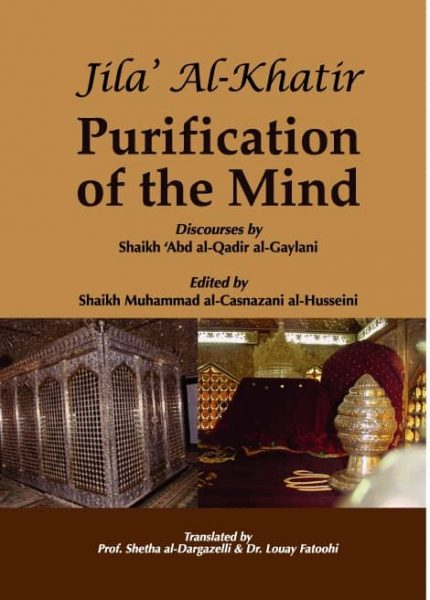Jila Al-Khatir: Purification of The Mind
Author: Shaykh Abd al-Qadir al-Jilani
Publisher: A. S. Noordeen
ISBN: 9789830650838
Pages: 222pp
Price: RM25
This book consists of 45 discourses that were given by Shaikh ‘Abd Al-Qadir Al-Jilani in his school in Baghdad. These discourses, like the ones found in some of his other books, would have been transcribed by some of his listener. There are a number of surviving manuscripts of the book. The language of Shaikh ‘Abd Al-Qadir’s discourses is often permeated by symbolic references, metaphorical images, and poetic expressions. This style, which is characteristic of the Shaikh’s discourses, reflects a number of facts. First, the Shaikh often speaks about spiritual matters that are completely unfamiliar to the layperson and which the language is incapable of describing with accuracy. These, in the Shaikh’s words, are states, stations, visions, and experiences that “no eye has ever seen, no ear has ever heard, and has never occurred to any human being.” Second, the Shaikh’s words spring as much from his heart as from his mind, describing feelings as well as thoughts. He is forced to use common words to describe feelings that are known only to those who have had those spiritual experiences. No language is equipped enough to describe these feelings, in the same way that no words can assist in describing color to one born blind because it requires visual experience. Third, the Shaikh often speaks about secret and intimate spiritual issues that he does not want to or cannot fully disclose, thus wrapping his words in metaphors. The words of Shaikh Al-Jilani do not describe one spiritual state and are not targeted at one person. They paint a fascinating picture of a myriad of spiritual states and stations and apply to people of very different beginnings, paths, and ends. The destination is the same, but the routes are different. Also different wayfarers end their journeys at different points. What is good for someone might not good for another, and what is required of two different people might be completely different, even though both have the same goal. This is why understanding the Shaikh’s words and their applications is a science in its own right. As Sufis say: “The ways to Allah are as many as the creatures.” The words of the Shaikh remain as relevant to the seeker of the truth and nearness to God as they were when he uttered them almost one thousand years ago. For sure, the world has changed a lot, but man’s nature has not, and the diseases of his heart remain the same. The Shaikh’s words address these diseases and show man the way to salvation. His words lived a thousand years and will live to the day when this transient world is no more and is replaced by the permanent one. Like all beacons of truth, the Shaikh has been the target of attacks of the ignorant, the narrow minded, and the misguided. As happened to others who understood Islam to be about works of the heart not acts of the body, this pious servant, whose life was fully dedicated to serving his Lord, has often been accused of distorting the message of Prophet Muhammad by those who wanted to hijack Islam and turn it into a spiritless, legalistic system to serve their worldly ambitions. But, as history has been confirming everyday, the voice of truth can never be silenced and the words of wisdom will remain inerasable. It is ignorance of this fact, as well as mistaking falsehood for truth, that must have made some misguided individuals to use terrorism against the Shaikh as they bombed his shrine in Baghdad on 28th May 2007, damaging parts of it. These and similar criminals do not realize that what made great masters such as Shaikh ‘Abd Al-Qadir live forever is not buildings that commemorate them or books written about them, but the teachings and examples they set that live in people’s minds and love for God that they helped them develop in their hearts. This is why almost one thousand years after his departure from this world people still feel immensely honored to serve the Shaikh and his sacred cause, including making his words more accessible to people.








